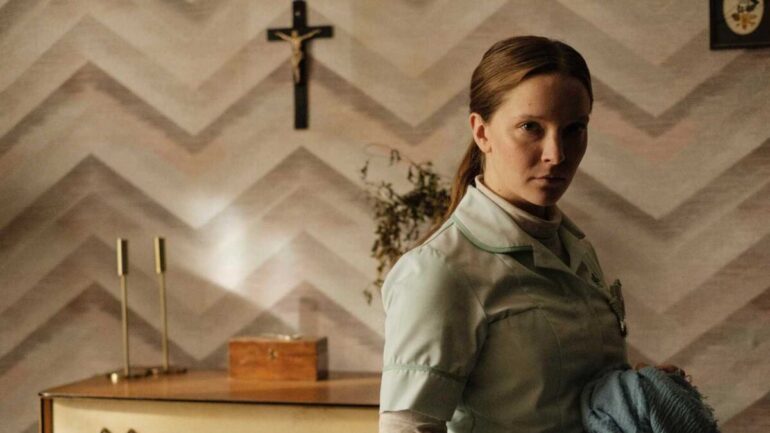Focusing on a recently converted Roman Catholic called Maud (played by Swedish-born Welsh stage actress Morfydd Clark) who works as a hospice nurse, Saint Maud is distributed by A24, a rare distribution company with their own fanbase. As the production company behind unique releases such as Denis Villenueve’s Enemy, Robert Eggers’ The Lighthouse, Ari Aster’s Midsommar, and Barry Jenkins’ Moonlight, I entered the cinema curious and uncertain.
Saint Maud has a running time of just 83 minutes, and yet seems to exist outside of time. The pacing is slow and gradual, Glass taking her time with the setting of scenes, unsettling the audience as they watch. However, the expectation of a methodical and glacial film is offset by the briskness of those 83 minutes, meaning it never overstays its welcome despite the languid pace. Instead, the editing allows the movie to flow with minimal fat and a preciseness in direction.
The pacing is assisted by the director’s style, utilising direction to convey character and tone from the onset. This is especially relevant with the protagonist, Glass’ use of framing helping to create a sparseness around Maud. Whenever Maud is on screen, she’s often placed near the centre of the shot while Glass projects an obvious emptiness around her, creating a negative space that becomes a suffocating aura. That space helps to accentuate the loneliness of the character, defining the isolation from the world around her.
The importance of this framing subtly enforces the uncomfortable nature of Maud, her seclusion from the world making her interactions awkward and unnatural. In one scene, she tries to integrate into a table of strangers, mimicking their laughter, only to realise the ineptitude of her attempt. This helps convey the importance of her growing relationship with her latest patient, cancer-ridden retired dancer Amanda (played by Jennifer Ehle of Zero Dark Thirty and A Quiet Passion), whose early interest in Maud’s religious nature creates an unexpected connection between the two.
However, the possible threats to not only their relationship but Amada’s soul begin to unveil the underlying trauma that has left Maud in her current state. With hints of supernatural elements pushing and impacting upon both characters, the mental health of each individual comes to the forefront. Because of this, the editing and direction grows off-kilter, with enough vagueness to leave you uncertain about the truth. The question becomes whether the events shown are allegorical, literal, or psychological, opening the movie up to interpretation, an element that might polarize audiences.
This uncertainty had me remembering Jeff Nichols’ 2011 cult classic Take Shelter, which also portrays a protagonist hearing and seeing visions but shown with enough enigma to leave the audience uncertain. Just like the tremendous lead performance by Michael Shannon in the aforementioned movie, Clark balances the contrasting mental states in Maud excellently in a fascinating turn that should gain attention from audiences and critics alike.
Another undoubted positive is the soundtrack, which is very reminiscent of Robert Eggers’ The Lighthouse. The building of tension through the foreboding booms of inevitable doom may leave you on edge in anticipation. I found the music perfectly supported the atmosphere as it draws you in, almost enveloping you as the dread increases. The strong sound mixing encapsulates the tremendous work from the entire cast and crew, with Glass’ script and direction crafting a fascinating story open to multiple interpretations. With the cast demonstrating subtle portrayals that allows a second viewing to add new context, it’s a wonderfully successful debut piece from a talented individual with potential to develop.
The only negative might be how audiences respond to the story’s open-ended nature, that refuses to spoon-feed viewers answers or simplify the experience. As an experience, Saint Maud is overwhelming. I left the cinema in a state of surprise and needed time to gather my thoughts, but I intuitively knew I had just witnessed a tremendous film. Even if you’re an audience member less fond of stories that present their work without the answers spelled out, you may owe it to yourself to at least allow Saint Maud an opportunity to grab you.
READ NEXT: 15 Best Zombie Movies To Stream
Some of the coverage you find on Cultured Vultures contains affiliate links, which provide us with small commissions based on purchases made from visiting our site. We cover gaming news, movie reviews, wrestling and much more.




